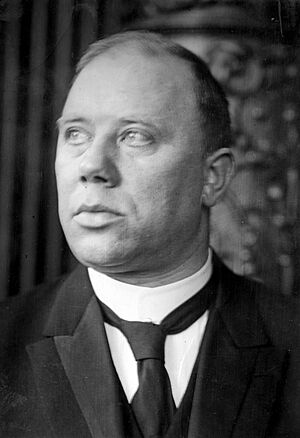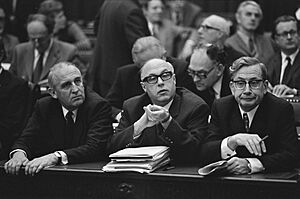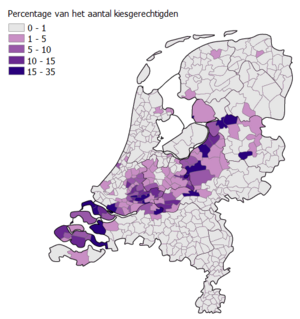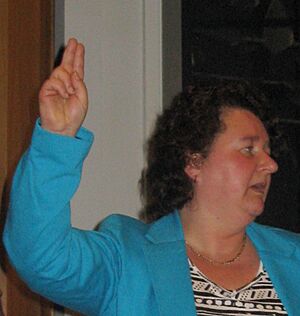Reformed Political Party facts for kids
Quick facts for kids <div style="padding-top:0.3em; padding-bottom:0.3em; border-top:2px solid Lua error in Module:European_and_national_party_data/config at line 227: attempt to index field 'data' (a nil value).; border-bottom:2px solid Lua error in Module:European_and_national_party_data/config at line 227: attempt to index field 'data' (a nil value).; line-height: 1;">
Reformed Political Party
Staatkundig Gereformeerde Partij
|
|
|---|---|
 |
|
| Abbreviation | SGP |
| Leader | Chris Stoffer (list) |
| Chairman | Dick van Meeuwen (list) |
| Leader in the Senate | Peter Schalk (list) |
| Leader in the House of Representatives | Chris Stoffer (list) |
| Leader in the European Parliament | Bert-Jan Ruissen |
| Founded | 1918 |
| Headquarters | Dinkel 7 Rotterdam |
| Youth wing | Reformed Political Party Youth |
| Think tank | Guido de Brès Foundation |
| Membership (January 2025) | |
| Ideology |
|
| Political position | Right-wing |
| Religion | Reformed Christianity |
| European affiliation | European Christian Political Party |
| European Parliament group | European Conservatives and Reformists Group |
| Colours | <span style="background-color:Lua error in Module:European_and_national_party_data/config at line 227: attempt to index field 'data' (a nil value).; color:; border:1px solid darkgray; text-align:center;"> Orange Blue |
| House of Representatives | Lua error in Module:European_and_national_party_data/config at line 227: attempt to index field 'data' (a nil value). |
| Senate | Lua error in Module:European_and_national_party_data/config at line 227: attempt to index field 'data' (a nil value). |
| European Parliament | Lua error in Module:European_and_national_party_data/config at line 227: attempt to index field 'data' (a nil value). |
| provincial councils |
16 / 570
<div style="background-color: Lua error in Module:European_and_national_party_data/config at line 227: attempt to index field 'data' (a nil value).; width: 3%; height: 100%;">
|
| Website | |
| Lua error in Module:European_and_national_party_data/config at line 227: attempt to index field 'data' (a nil value). | |
The Reformed Political Party (in Dutch: Staatkundig Gereformeerde Partij, or SGP) is a political party in the Netherlands. It is based on the beliefs of Reformed Christianity. The SGP is the oldest political party in the Netherlands that still exists in its original form.
For its entire history, the SGP has been an opposition party, meaning it has not been part of the ruling government. In elections, it usually gets between 1.5% and 2.5% of the vote. Because it sticks to its traditional beliefs, it is sometimes called a "testimonial party," which means its main goal is to share its ideas rather than to gain power.
Contents
History of the SGP
How the Party Began
The SGP was founded in 1918. Its founder was Gerrit Hendrik Kersten, a pastor from the town of Yerseke. He and other orthodox Protestants felt that the other Christian party at the time, the Anti-Revolutionary Party (ARP), was not strict enough.
A new voting system called proportional representation was introduced in the Netherlands. This system made it easier for smaller parties to win seats in the government. Kersten and his followers saw this as a chance to create a party that truly represented their beliefs.
The party first took part in the general election of 1918. They campaigned against rules they disagreed with, like compulsory vaccination. They did not win any seats in their first election, but they continued to grow.
The Early Years (1922–1945)
In the 1922 election, the party's founder, Kersten, ran as the main candidate. This time, the SGP won one seat in the House of Representatives, which is a part of the Dutch parliament. Kersten became known for his strong speeches. For example, he spoke out against the 1928 Summer Olympics being held in Amsterdam.
In 1925, the party won a second seat. That same year, the SGP played a key role in causing the government to fall. This event became known as the "Night of Kersten." Kersten proposed a cut to the government's funding for its representative to the Holy See (the government of the Catholic Church). His proposal passed because another Protestant party supported it, which led to the government collapsing. This event made the SGP more famous, and they won a third seat in the 1929 election.
During World War II, Kersten had a controversial view of the German invasion. He believed it was a punishment from God for the country's sins. Because of his views during the war, he was not allowed to return to the House of Representatives after the war ended.
After World War II (1945–Present)
After Kersten, Pieter Zandt became the party's leader. Under his leadership, the SGP remained very stable, always getting about 2% of the vote. In 1956, the party won a seat in the Senate (the other part of the Dutch parliament) for the first time.
Over the years, the party had several different leaders, including Bas van der Vlies, who led the party from 1986 to 2010. In 2003, for the first time, the SGP was seriously considered as a partner in a coalition government. A coalition is when multiple parties agree to work together to rule. In the end, another party was chosen instead.
From 2010 to 2023, the party was led by Kees van der Staaij. The current leader is Chris Stoffer. The SGP continues to be a small but steady party in Dutch politics.
What the SGP Believes
The SGP's ideas come from the Reformed Christian faith. The party's beliefs are written down in historical documents called the Three Forms of Unity. One of these, the Belgic Confession, includes a statement that the government should fight against "false religion." This is a key difference between the SGP and other Christian parties.
Government and Religion
The SGP believes that the government should be based on the rules of the Bible. This idea is called a theocracy. However, the party's view on this has changed over time. They believe the church and the state should work together but remain separate. The government should protect the church, and the church should not try to control the government.
The party supports freedom of conscience, which means people should be free to believe what they want in their hearts. However, they do not support complete freedom of religion for all groups. The SGP is also critical of Islam and opposes public displays of the faith, such as large mosques.
Social Issues
The SGP has traditional views on social issues. For a long time, the party was against women having the right to vote or run for office. They believed it went against a woman's role in life. However, the party has changed its rules over time.
In 1989, the party allowed women to vote if their conscience allowed it. Later, after a court ruling, the party also allowed women to be candidates in elections. The party supports bringing back the death penalty for very serious crimes.
Support for Israel
The SGP is a strong supporter of Israel. In the past, the party was not as focused on this issue. But after Israel was founded in 1948, sympathy for the country grew among SGP members. Today, the party's official program states that having good relations with Israel is very important.
Who Votes for the SGP?
The SGP's voters have been very loyal since the party started. Most of its support comes from a specific group of Protestants who are part of "pietistic" Reformed churches. For these voters, personal religious experience is very important.
The party's support is mainly found in an area of the Netherlands known as the Dutch Bible Belt. This is a strip of land with many small towns and rural areas where a large part of the population is strictly religious. It runs from Zeeland in the south, through the middle of the country, to the province of Overijssel.
Interestingly, even though the party historically had rules against women in politics, a large number of its voters are women. In recent elections, nearly 60% of SGP voters were female.
How the Party is Organized
The SGP has a youth organization called the Reformed Political Party Youth (SGPJ). It also has a "think tank," the Guido de Brès Foundation, which studies important issues and publishes a magazine. The party also has close ties to other Protestant organizations, like the newspaper Reformatorisch Dagblad.
For many years, the SGP worked with other Protestant parties, like the Christian Union (CU). They even ran in European elections together on a combined list called CU–SGP. However, in recent years, the CU has moved more to the political center, and the two parties now run separately.
Election Results
House of Representatives
| Election | Lead candidate | List | Votes | % | Seats | +/– | |
|---|---|---|---|---|---|---|---|
| 1918 | Barend Lemans | List | 5,180 | 0.39 |
|
New | |
| 1922 | Gerrit Hendrik Kersten | List | 26,744 | 0.91 |
|
||
| 1925 | List | 62,513 | 2.03 |
|
|||
| 1929 | List | 71,420 | 2.27 |
|
|||
| 1933 | List | 93,275 | 2.51 |
|
|||
| 1937 | List | 78,619 | 1.94 |
|
|||
| 1946 | Pieter Zandt | List | 101,761 | 2.16 |
|
||
| 1948 | List | 116,864 | 2.37 |
|
|||
| 1952 | List | 129,073 | 2.42 |
|
|||
| 1956 | List | 129,515 | 2.26 |
|
|||
| 1959 | List | 129,678 | 2.16 |
|
|||
| 1963 | Cor van Dis Sr. | List | 143,549 | 2.29 |
|
||
| 1967 | List | 138,119 | 2.01 |
|
|||
| 1971 | Hette Abma | List | 148,221 | 2.35 |
|
||
| 1972 | List | 163,114 | 2.21 |
|
|||
| 1977 | List | 177,010 | 2.13 |
|
|||
| 1981 | Henk van Rossum | List | 171,324 | 1.97 |
|
||
| 1982 | List | 156,636 | 1.90 |
|
|||
| 1986 | Bas van der Vlies | List | 159,740 | 1.74 |
|
||
| 1989 | List | 166,082 | 1.87 |
|
|||
| 1994 | List | 155,251 | 1.73 |
|
|||
| 1998 | List | 153,583 | 1.78 |
|
|||
| 2002 | List | 163,562 | 1.72 |
|
|||
| 2003 | List | 150,305 | 1.56 |
|
|||
| 2006 | List | 153,266 | 1.56 |
|
|||
| 2010 | Kees van der Staaij | List | 163,581 | 1.74 |
|
||
| 2012 | List | 196,780 | 2.09 |
|
|||
| 2017 | List | 218,950 | 2.08 |
|
|||
| 2021 | List | 215,249 | 2.07 |
|
|||
| 2023 | Chris Stoffer | List | 217,270 | 2.08 |
|
Senate
| Election | Lead candidate | List | Votes | Weighted votes |
% | Seats | +/– | |
|---|---|---|---|---|---|---|---|---|
| 2023 | Peter Schalk | List | 17 | 4,436 | 2.76 |
|
European Parliament
| Election | List | Votes | % | Seats | +/– | EP Group |
|---|---|---|---|---|---|---|
| 1979 | List | 126,412 | 2.23 |
|
New | |
| 2024 | List | 228,036 | 3.66 |
|
Between 1984 and 2019, the SGP filed joint candidate lists with the Christian Union and its predecessors. See CU-SGP for these election results.
Since 1984, the party has had one representative in the European Parliament. This person is a member of the European Christian Political Party and the European Conservatives and Reformists Group (ECR Group).
See also
 In Spanish: Partido Político Reformado para niños
In Spanish: Partido Político Reformado para niños
 | Emma Amos |
 | Edward Mitchell Bannister |
 | Larry D. Alexander |
 | Ernie Barnes |






